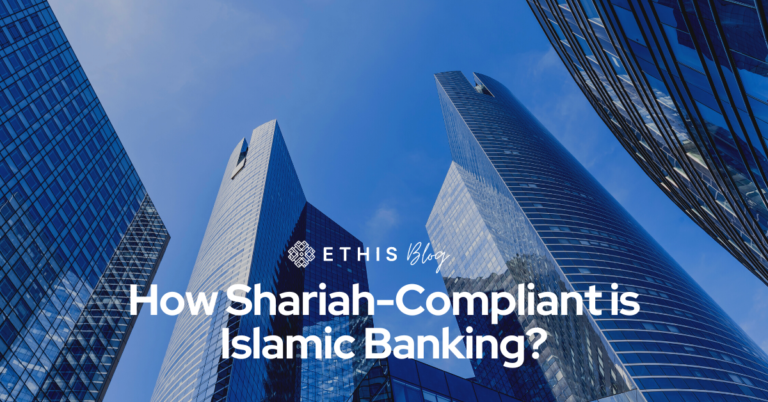
By Adnan Opeyemi Salaudeen – Muslims and non-Muslims have frequently asked this question, leading to some misconceptions about Islamic Banking and Finance (IBF).
The question is always “how Islamic is Islamic banking and finance?” and “how are they different from conventional banks.”
Some contemporary Islamic banking and finance critics argue that IBF is just a change in terminologies and name. Still, the system remains the same as the conventional banking system (e.g., substituting ‘profit’ for ‘interest rate’).
It is nothing new to say that IBF operates in the same environment and competitive scenario as the conventional banking system. It also uses almost the same products. So what are the differences?
Differences between Islamic banking and finance vs conventional banking and finance


Firstly, one of the principles of Islamic Jurisprudence (Usul-fiqh) states: “all transactions are allowed until we find a text (Quran, Hadith or any other source) that prohibits the transaction,” as Sheikh Taqi Usmani has observed.
The point by Sheikh Taqi proves that IBF can also operate conventional banking products provided they do not involve any of the prohibited elements such as Riba (usury or interest), Maysir (gambling), Gharar (uncertainty), hoarding, and dealing in illicit goods and services, which are among the divinely instituted restrictions.
All these prohibitions have a comprehensive effect on maintaining balance, distributive justice, and equality of opportunities compared to conventional banking, which uses interest as the primary capitalist tool.
In a paper, Dahlia El Hawary states that regulating Islamic financial institutions defines and differentiates IBF from the conventional banking system because IBF must adhere to the following four principles:
(1) Risk-sharing: the terms of financial transactions need to reflect asymmetrical risk/return distribution among each participant in the transaction;
(2) Materiality: all financial transactions must have “material finality,” i.e., are directly linked to an actual underlying economic transaction; thus, options and most other derivatives are banned;
(3) No exploitation: neither party to the transaction should be exploited;
(4) Not financing sinful activities: transactions cannot be used to produce goods banned by the Quran (e.g., alcohol, pork, products, gambling, etc.).
Related: How Worldview and Ethics Shape Islamic Economics and Finance



How do Islamic banks make money?


Islamic law holds that making money from money is wrong, and Shariah-compliant institutions tend to refrain from engaging in doubt or speculation. Instead of lending money to their clients at a profit, they buy the underlying product—the house, the car, the refrigerator—and then lease it or re-sell it on installment to the client for a fixed price typically higher than the initial market value.
The essential notion here is risk-sharing. The banks profit from the transaction as a reward for their risk to the customer. Instead of thriving off interest rates, Islamic banks use their customers’ money (Islamic Deposits) to acquire assets such as property or businesses and profit when the loan is successfully repaid.
Products in Islamic banking and Islamic finance
As we all know, the conventional banking system’s main product is a loan with interest with depositors’ money. In contrast, the IBF system offers numerous Shariah-compliant products, which are of two types: Source of Funds and Application of Funds.
Source of Funds includes Wadiah (Islamic Deposit -CASA-), Mudarabah (Investment Account), Murabahah (Fixed/Term Deposit), and more. In contrast, the application of funds includes Musharakah, Tawaruq, Istisna, Ijarah, and more, and contract services like Ujra, Wakalah, Jualah, and the like.
These stated and more products are Shariah-compliant as each of these products and contracts creates a different relationship between the bank and the customer.
For example, Wadiah builds depositors and custodian relationships, Murabahah is the seller and buyer, while Musharakah is the Partnership. The relationship changes from one product to another, compared to the conventional system that only has a Debtors and Creditors relationship in all contracts.
Related: 6 Crucial Components of the Islamic Financial System
Conclusion on Islamic banking and finance


Islamic Banking and Finance works within the Shariah law and principles, following certain restrictions:
- IBF cannot provide finance for an activity prohibited by Shariah (Islamic Law), e.g., businesses dealing in alcohol, pork, and more.
- IBF cannot give any loan in cash for interest; nevertheless, IBF customers’ financial needs are met through the supply of required assets on a profit and loss sharing basis.
- Under the Islamic Financial System, when financing is provided under a profit-sharing contract, profit is shared according to the agreement between the two parties. Still, two parties must share the loss according to capital/ownership.





Top Posts
Islamic P2P Crowdfunding Explained
Halal Money Matters: How Muslims Can Balance Deen and Dunya with Smart Islamic Finance
Halal Investments for Singapore Muslims? It’s time for a shake-up in the Islamic Investments scene.
Smart investment for making Halal money
3 Reasons Why Property Crowdfunding is the Smart Investment for You